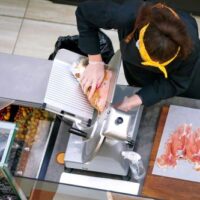Grocery Store Deli Worker Injuries

Nearly every job at a grocery store or food market comes with some injury risks, but some roles are more hazardous than others. Almost all supermarket employees can sustain injuries due to overexertion and repetitive movements, as well as injuries caused by slips and falls at work. At the same time, certain types of employees handle dangerous machinery that comes with its own severe risks. Deli workers are in that group. As the Occupational Safety and Health Administration (OSHA) emphasizes, any grocery store work that requires the use of food slicers and meat grinders is a dangerous one.
If you were severely injured while working in a supermarket deli, it is important to seek workers’ compensation benefits. In the meantime, our Maryland workers’ compensation lawyers can tell you more about these types of injuries and what you should know about them.
Common Work Injuries Among Deli Workers in Supermarkets, Butcher Shops, and More
Food service jobs that require the use of food slicers and meat grinders, including in supermarkets and butcher shops, are hazardous ones. As OSHA explains, these machines “can cause serious cuts and amputations when workers operate, perform maintenance, or clean the machines.” Amputations in particular are common types of injuries among workers who must use or perform maintenance on these machines, and amputations can result in permanent disabilities and death.
What are these machines and why are they so dangerous? According to OSHA, food slicers “Are electrically powered machines typically equipped with a rotary blade,” and they can quickly result in severe lacerations that can also involve traumatic amputations and blood loss. Electric meat grinders are also electrically powered machines that allow meat to be pulled into them and “through the cutting plate,” which can cause severe and traumatic amputations if a worker’s finger or hand becomes trapped in the machine.
In addition to amputation and laceration injuries caused by food slicers and meat grinders, deli workers are also at risk of many other common types of injuries among supermarket workers. They are often required to lift heavy materials, to perform repetitive motions (frequently in food slicing), and to stand on their feet for extended periods of time. All of these tasks can result in ergonomic injuries that can also result in missed days of work and eligibility for workers’ compensation benefits.
Contact a Maryland Workers’ Compensation Attorney for Help Today
Are you a grocery or butcher shop worker who was injured on the job? If you have not already sought workers’ compensation benefits, you should seek advice from an experienced Maryland food store worker injury lawyer at the Law Offices of Steinhardt, Siskind and Lieberman, LLC today. In addition to receiving coverage for your medical care and payments for lost wages during the time that you are unable to work, you may also be eligible to receive permanent disability benefits if you suffered an amputation injury. Do not hesitate to reach out to our firm to find out more about how we can help you to obtain the benefits you need at this difficult time. Contact us for more information.
Source:
osha.gov/sites/default/files/publications/OSHA3794.pdf


